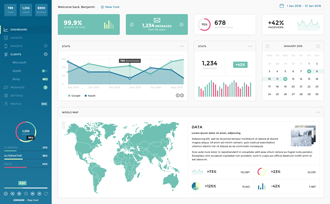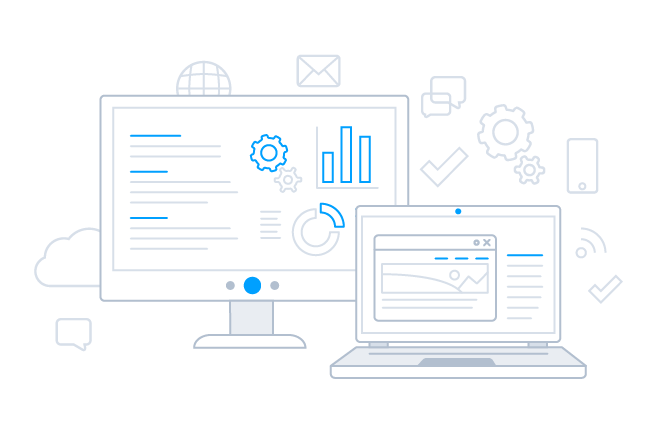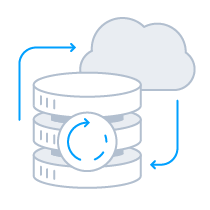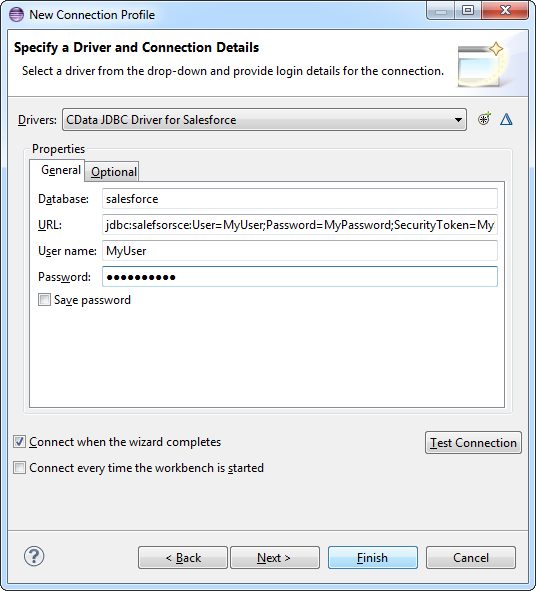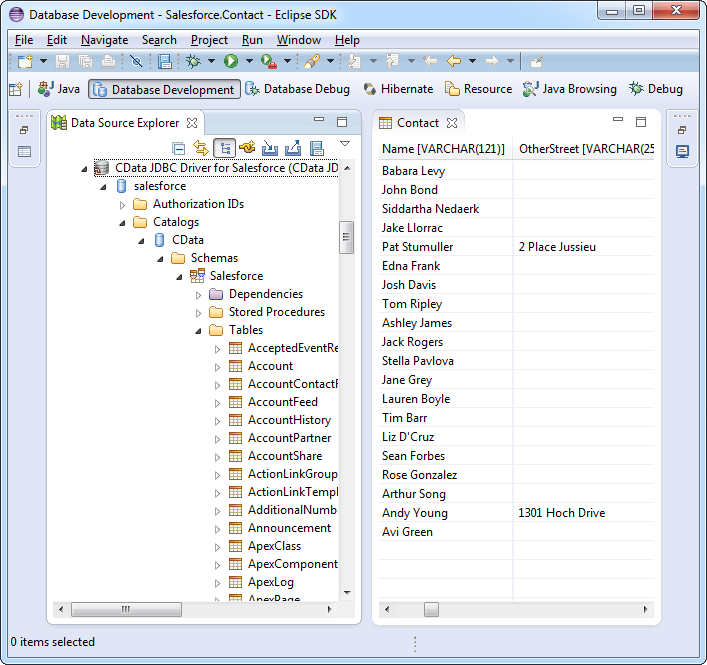Discover how a bimodal integration strategy can address the major data management challenges facing your organization today.
Get the Report →
The Microsoft OneDrive JDBC Driver enables users to connect with live Microsoft OneDrive data, directly from any applications that support JDBC connectivity. Rapidly create and deploy powerful Java applications that integrate with Microsoft OneDrive.
Features
- Fully compatible with the OneDrive REST API
- Use SQL Stored Procedures to perform actions like creating folders, uploading resources, downloading files, and more
- Connect to live Microsoft OneDrive data, for real-time data access
- Full support for data aggregation and complex JOINs in SQL queries
- Secure connectivity through modern cryptography, including TLS 1.2, SHA-256, ECC, etc.
- Seamless integration with leading BI, reporting, and ETL tools and with custom applications
Specifications
- JDBC Driver for Microsoft OneDrive with bi-directional access.
- Write SQL, get Microsoft OneDrive data. Access Microsoft OneDrive through standard Java Database Connectivity.
- Codeless integration with popular BI, Reporting, & ETL Tools.
- Integrate Java Apps with Microsoft OneDrive Files, Changes, Apps, and more!
- Full Unicode support for data, parameter, & metadata.
- Support for 32-bit and 64-bit operating systems.
JDBC Access to Microsoft OneDrive
Full-featured and consistent SQL access to any supported data source through JDBC
-
Certified Compatibility*
Our drivers undergo extensive testing and are certified to be compatible with leading analytics and reporting applications like SAP Crystal Reports, Pentaho, Business Objects, Crystal Reports and many more.
-
Metadata Discovery
Full support for JDBC DatabaseMetaData provides extensive schema discovery capabilities. Explore tables, columns, keys, and other data constructs based on user identity.
-
Developer Friendly
Design-time support for all major Java IDEs, including Eclipse, IntelliJ, and NetBeans.
-
JDBC Remoting
Our exclusive remoting feature allows hosting the JDBC connection on a server to enable connections from various clients on any platform (Java, .NET, C++, PHP, Python), using any standards-based technology (ODBC, JDBC, etc.). JDBC Remoting is enabled using the popular MySQL wire protocol server.
-
Replication and Caching
Our replication and caching commands make it easy to copy data to local and cloud data stores such as Oracle, SQL Server, Google Cloud SQL, etc. The replication commands include many features that allow for intelligent incremental updates to cached data.
-
String, Date, Numeric SQL Functions
The driver includes a library of over 50 functions that can manipulate column values into the desired result. Popular examples include Regex, JSON, and XML processing functions.
-
Collaborative Query Processing
Our drivers enhance the data source's capabilities by additional client-side processing, when needed, to enable analytic summaries of data such as SUM, AVG, MAX, MIN, etc.
-
Easily Customizable and Configurable
The data model exposed by our JDBC Drivers can easily be customized to add or remove tables/columns, change data types, etc. without requiring a new build. These customizations are supported at runtime using human-readable schema files that are easy to edit.
-
Secure Connectivity
Includes standard Enterprise-class security features such as TLS/ SSL data encryption for all client-server communications.
JDBC Driver Performance
With traditional approaches to remote access, performance bottlenecks can spell disaster for applications. Regardless if an application is created for internal use, a commercial project, web, or mobile application, slow performance can rapidly lead to project failure. Accessing data from any remote source has the potential to create these problems. Common issues include:
- Network Connections - Slow network connections and latency issues are common in mobile applications.
- Service Delays - Delays due to service interruptions, resulting in server hardware or software updates.
- Large Data - Intentional or unintentional requests for large amounts of data.
- Disconnects - Complete loss of network connectivity.
The CData JDBC Driver for Microsoft OneDrive solves these issues by supporting powerful smart caching technology that can greatly improve the performance and dramatically reduce application bottlenecks.
Smart Caching
Smart caching is a configurable option that works by storing queried data into a local database. Enabling smart caching creates a persistent local cache database that contains a replica of data retrieved from the remote source. The cache database is small, lightweight, blazing-fast, and it can be shared by multiple connections as persistent storage.
Caching with our JDBC Drivers is highly configurable, including options for:
- Auto Cache - Maintain an automatic local cache of data on all requests. The provider will automatically load data into the cache database each time you execute a SELECT query. Each row returned by the query will be inserted or updated as necessary into the corresponding table in the cache database.
- Explicit Cache - Cache only on demand. Developers decide exactly what data gets stored in the cache and when it is updated. Explicit caching provides full control over the cache contents by using explicit execution of CACHE statements.
- No Cache - All requests access only live data and no local cache file is created.
This powerful caching functionality increases application performance and allows applications to disconnect and continue limited functioning without writing code for additional local storage and/or data serialization/deserialization.
More information about JDBC Driver caching and best caching practices is available in the included help files.
Enterprise-Class Remoting
MySQL/SQL Database entry points for Microsoft OneDrive Data
The CData JDBC drivers include powerful fully-integrated remoting capabilities that makes Microsoft OneDrive data accessible from virtually anywhere. The drivers include the optional ability to accept incoming SQL and MySQL client connections and service standard database requests.
With the CData JDBC drivers, users can interact with Microsoft OneDrive data from any client that supports SQL Server or MySQL: from web & mobile applications, to CRM and CMS systems, BI tools like SQL Server Analysis Services, and even through popular management applications like MySQL Workbench.
- Access Microsoft OneDrive data from virtually any application that can access external data. Applications that can access SQL Server or MySQL data can now connect to Microsoft OneDrive with this driver.
- Connect Microsoft OneDrive data with popular BI tools like SQL Server Analysis Services.
- Enable enterprise Microsoft OneDrive data integration through SQL Linked Server connectivity
- Includes support for the MySQL and SQL (TDS) remote access protocols - industry standards for remote database connectivity.
- Offers advanced wire-protocol SSL security for remote connectivity
Enterprise-class JDBC Connectivity
The Microsoft OneDrive JDBC Driver offers the most natural way to access Microsoft OneDrive data from any Java/J2EE application. Simply use the Microsoft OneDrive Driver to connect and access data just as you would access any traditional database. The driver is completely self-contained - no additional software installation is required!
Microsoft OneDrive Integration
The Microsoft OneDrive Driver has the same JDBC architecture as the JDBC drivers for MySQL and OLEDB, including Connection, Statement and ResultSet objects. Because of this you can now access Microsoft OneDrive data in an easy, familiar way. You can use the Microsoft OneDrive Driver through popular IDEs (Eclipse, IntelliJ, NetBeans, etc.), in code through familiar classes, and in data controls available through Swing, Eclipse SWT Widgets, etc.
For example:
Connection conn =
DriverManager.getConnection("jdbc:microsoftonedrive:user=myuseraccount;password=mypassword;");
boolean ret = stat.execute("SELECT * FROM Files");
ResultSet rs=stat.getResultSet();
while(rs.next()){
for(int i=1;i<=rs.getMetaData().getColumnCount();i++)
{
System.out.println(rs.getMetaData().getColumnName(i) +"="+rs.getString(i));
}
}
Popular JDBC Videos:








